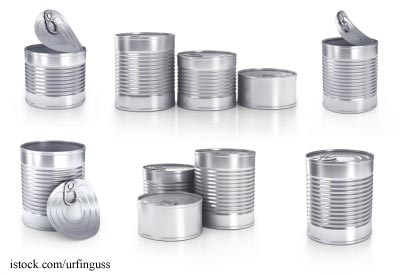Health Canada recently tested more than 400 samples of canned foods and found that they were safe to consume. The government said that BPA was not detected in 98.5% of the foods analyzed. The products tested included domestic and imported fruits, vegetables, juices, other beverages, legumes, pasta, and soups. Those products are packaged in cans treated with epoxy coatings.
 Low levels of BPA were found in only six of the canned food samples analyzed. The levels of the chemical in those foods did not indicate any safety concerns.
Low levels of BPA were found in only six of the canned food samples analyzed. The levels of the chemical in those foods did not indicate any safety concerns.
BPA is permitted in food packaging materials in Canada. Other countries, such as France, have banned the chemical in food packaging based on many studies that shows it can be harmful to human health. Epoxy resins that contain BPA are added to metal cans to protect foods from direct contact with metal. Acidic foods can react with metals, discoloring the foods and letting them pick up more copper and iron.
Unfortunately, BPA can also migrate from the coatings into the food, especially at high temperatures, such as when canned food is processed. Based on the Health Canada survey, an adult would have to consume 50 servings of canned food a day to reach an exposure to BPA that may pose a safety concern.
But Health Canada concluded that dietary exposure to BPA through food packaging doesn’t pose a health risk to newborns and young children. That conclusion is different from that reached in many other countries, including the US, which recently banned BPA from infant food packaging. The FDA continues to study BPA and its effects on human health.




